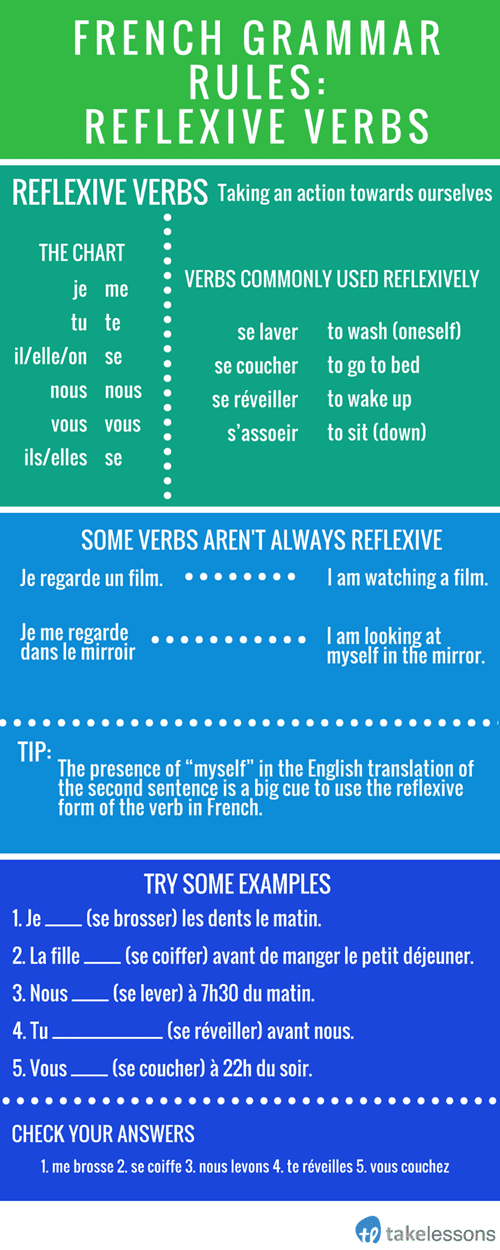Need to brush up on French reflexive verbs ? In this lesson, French tutor Carol Beth teaches how to conjugate French reflexive verbs in the present and past tenses…
French (and many other romance languages) include a category of verbs, called reflexive verbs, that are treated a little differently than in English.
Indeed, we have the same concept in English. We might say that we wash our face, we dress ourselves, and so on. That is, we are taking action towards ourselves. In French, this type of action is addressed by reflexive verbs.
Common French Reflexive Verbs
Here are a few verbs that are very commonly used reflexively:
se laver — to wash (oneself)
se laver les mains — to wash one’s hands
se coiffer — to do (one’s) hair
se coucher — to go to bed
se réveiller– to wake up
se lever — to get up
s’asseoir — to sit (down)
s’appeler — to be called
s’arrêter — to stop (oneself)
se taire — to be/become quiet
Some verbs are usually reflexive; some are only sometimes reflexive, depending on the situation. For example:
Je regarde un film. — I am watching a film.
Je me regarde dans le miroir. — I am looking at myself in the mirror.
The presence of “myself” in the English translation of the second sentence is a big cue to use the reflexive form of the verb in French.
How to Conjugate French Reflexive Verbs
Now for their conjugation. The main part of the verb (laver, coiffer, etc.) conjugates much like other French verbs. With the exception of the irregular s’assoeir and se taire, all those listed above are regular -er verbs. The reflexive portion (the “se”) conjugates as follows:
Je me
Tu te
Il / elle / on se
Nous nous
Vous vous
Ils / elles se
To conjugate a full example in the present tense:
Se laver (to wash oneself)
Je me lave
Tu te laves
Il / elle / on se lave
Nous nous lavons
Vous vous lavez
Ils / elles se lavent
Let’s try a few examples. Try conjugating the verbs in parenthesis in the following sentences:
1) Je _______________ (se brosser) les dents le matin.
I brush my teeth in the mornings.
2) La fille _______________ (se coiffer) avant de manger le petit déjeuner.
The girl brushes her hair before eating breakfast.
3) Nous _______________ (se lever) à 7h30 du matin.
We get up at 7:30 in the morning.
4) Tu _______________ (se réveiller) avant nous.
You wake up before us.
5) Vous _______________ (se coucher) à 22h du soir.
You go to bed at 10:00 at night.
Now check your answers:
1) me brosse
2) se coiffe
4) te réveilles
5) vous couchez
Most other tenses are pretty straightforward, since the same endings still tack themselves onto the end just like other French verbs.
French Reflexive Verbs in the Past Tense
The tense to watch out for the most is the passé composé. Reflexive verbs always take être (not avoir) as their auxiliary verb.
Like verbs of motion, the past participle will agree with the subject’s number and gender. The conjugation of être will go between the reflexive particle and the main verb. So se laver would conjugate itself as follows:
Je me suis lavé(e)
Tu t’es lavé(e)
Il s’est lavé
Elle s’est lavée
On s’est lavé
Nous nous sommes lavé(e)s
Vous vous êtes lavé(e)(s)
Ils se sont lavés
Elles se sont lavées
The optional e’s and s’s following the je, tu, nous, and vous forms depend on the context in which they are used and whether the subject is masculine, feminine, singular, or plural. Let’s try a few of these out. Try conjugating the verbs in parenthesis in the passe compose in each of the following sentences:
1) Je _______________ (se brosser) les dents ce matin.
I brushed my teeth this morning.
2) La fille _______________ (se coiffer) avant de manger le petit déjeuner.
The girl brushed her hair before eating breakfast.
3) Nous _______________ (se lever) à 7h30 hier matin. (Assume the speaker and the friends or family she is including are all women or girls.)
We got up at 7:30 yesterday morning.
4) Tu _______________ (se réveiller) avant nous. (You can decide whether you are speaking to a man, woman, boy, or girl.)
You woke up before us.
5) Vous _______________ (se coucher) à 22h hier soir. (Assume the speaker is talking to many people, of whom at least one of which is a guy.)
You went to bed at 10:00 last night.
6) Le garçon _____________ (se coucher) à vingt-et-une heures.
The boy went to bed at 9pm.
Now check your answers.
1) me suis brossé
2) s’est coiffée
3) nous sommes levées
4) t’es réveillé(e)
If you decided you were speaking to a man or boy, be sure you didn’t add the extra “e.” Make sure you did if you decided you were talking to a woman or girl.
5) vous êtes couchés
6) s’est couché
If you didn’t get them all right this time, don’t worry. Either way, keep practicing and using these verbs in context to master them. See even more French verb and grammar lessons here!
Do you have any additional tips for memorizing French reflexive verbs? Share them with us in the comments below!
 Post Author: Carol Beth L.
Post Author: Carol Beth L.Carol Beth teaches French lessons in San Francisco, CA. She has her Masters in French language education from the Sorbonne University in Paris and has been teaching since 2009. Learn more about Carol Beth here!
Megan L.


